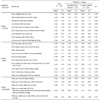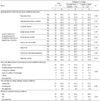Abstract
This study was conducted to investigate how child-care teachers participate, practice mealtime instruction, and perceive difficulties in food service, focusing on comparison between the teachers caring two different age groups: children younger than three years (Younger Group) and those three years or older (Older Group). Questionnaires were distributed to 151 child-care centers in Kwanak-gu, Seoul, Korea during December, 2011. Only the data from 25 child-care centers, where two respective teachers in charge of Younger Group and Older Group completed the questionnaires, were analyzed. The results showed that there was no difference in terms of child-care teachers' participation in food service practice between the two groups, except for serving method; 'Pre-plated' serving was used significantly more often in Younger Group, whereas 'Line-up' serving was used in Older Group. Approximately, three quarters of the child-care centers had policies or guidelines on mealtime instruction. During mealtime, child-care teachers tended to use frequently verbal instructions such as "sit up straight when you eat" about eating manner, "don't be picky with your food" about eating habit, and "wash your hands before eating" about eating procedure in both the groups. There was no statistically significant difference regarding child-care teachers' perceived difficulties in food service between the two groups. These results indicated that child-care teachers' participation and mealtime instruction in food service did not differ between the two age groups, although children's development of digestion and eating skill differed by age. Therefore, training should be provided to child-care teachers about food service practices and mealtime instruction appropriate to children's age.
Figures and Tables
References
1. Bae HJ, Lee HY, Ryu K. Field assessment of food safety management at preschool foodservice establishments. Korean J Food Cookery Sci. 2009. 25(3):283–296.
2. Chang H, Ko E. The effectiveness of nutrition education provided by dietitian in child care centers. Korean J Community Nutr. 2007. 12(3):299–309.
3. Chang HJ, Park YJ, Ko ES. Current and future foodservice management performance in child-care centers. J Korean Diet Assoc. 2008. 14(3):229–242.
4. Choi EM, Sin EK, Jung YY, Lee NH, Choi CH, Jung HS, Cho EJ, Sung HI, Lee HY, Lee EJ, Park HK, Kim SH, Lee YK. Status of food and nutrient intakes by spot investigation of children's foodservice establishments. Proceeding of the 2008 Autumn Symposium of Korean Society of Community. 2008. Nutrition;118.
5. Chung MR, Lee YM, Lee KW. A study on the nutritional evaluation and food service managements of snacks in early childhood education institute. J Korean Home Econ Assoc. 2000. 38(4):99–113.
6. Hendy HM, Raudenbush B. Effectiveness of teacher modeling to encourage food acceptance in preschool children. Appetite. 2000. 34(1):61–76.
7. Jennings A, McEvoy S, Corish C. Nutritional practices in full-day-care pre-schools. J Hum Nutr Diet. 2011. 24(3):245–259.
8. Lee KH, Park DY, Lee IY, Hong JY, Choi BC, Bae SS. The survey on the nutrition education and food service managements system of the early childhood education institute in Yongdungpo. J Korean Diet Assoc. 2001. 7(2):167–174.
9. Lee YM, Jung BR, Bae SY. Health and nutrition education for early childhood. 2007. Yangseowon.
10. Lee YS, Lim HS, Ahn HS, Chang NS. Nutrition throughout the life cycle. 2011. Kyomunsa.
11. Ministry of Health and Welfare. Statistics of childcare. 2011a.
12. Ministry of Health and Welfare. Guidance of childcare center. 2011b.
13. National Food Service Management Institute. Care connection: Happy mealtimes. 2012. cited 2012 April 22. Available from http://www.nfsmi.org/documentlibraryfiles/PDF/20100917032729.pdf.
14. Rho JO, Lee SI, Lee JS. A study on the dietary behaviors of day-care center teachers and their meal attitude education during meal time in Jeonju area of Korea. Korean J Food Nutr. 2010. 23(3):342–351.
15. Sigman-Grant M, Christiansen E, Branen L, Fletcher J, Johnson SL. About feeding children: Mealtimes in child-care centers in four western states. J Am Diet Assoc. 2008. 108:340–346.
16. Song ES, Kim EG. The foodservice sanitation status of the child care centers at Asan city in Chungnam. Korean J Community Nutr. 2010. 15(6):806–819.
17. Song J, Heo YR. A study on nursery school teachers knowledge and education of nutrition care in Gwang-ju. Korean J Community Nutr. 2010. 15(2):159–168.
18. Statistics Korea. 2011. cited 2011 November 16. Available from http://kostat.go.kr/portal/korea/index.action.
19. Yoon JS. Teacher characteristics as predictors of teacher-student relationships: stress, negative affect and self-efficacy. Soc Behav Personal. 2002. 30(5):485–493.
20. You GJ, Cho HJ. Introduction of infant and early childhood education. 2009. Gongdong chae;15–54. 349–390.




 PDF
PDF ePub
ePub Citation
Citation Print
Print









 XML Download
XML Download